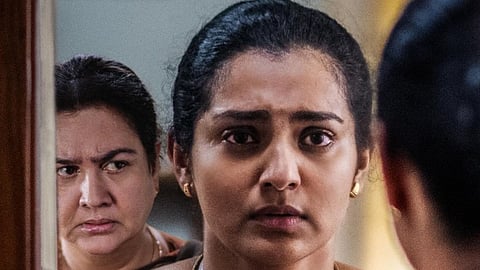Ullozhukku Movie Review: An in-depth exploration of complex themes
Ullozhukku(3.5 / 5)
In cinema, it often rains during a dramatic scene, like a major character's death. It is a classic metaphor suggesting that even nature sheds tears for the departed. In Ullozhukku, which swivels mostly around death, the rains are much more significant, as the heavy downpour hinders a funeral for days. In a strange twist of fate, as the family desperately waits for the burial, certain secrets they had buried—some for years—start floating up.
Directed by: Christo Tomy
Cast: Urvashi, Parvathy Thiruvothu, Arjun Radhakrishnan, Prashant Madhav, Alencier Ley Lopez
The film begins with a rosy Anju (Parvathy Thiruvothu) having a private conversation with her boyfriend Rajeev (Arjun Radhakrishnan), but in the very next scene, she is seen as a timid bride, married to Thomaskutty (Prashant Murali). Anju is clearly unhappy with the wedding but tries putting up a cheerful face. When her mother breaks down while leaving Anju at her husband's place, Leelamma (Urvashi), the mother-in-law, steps in and assures her that she will take care of her like her own daughter. It's the start of a strong bond. But wait till Thomaskutty's demise for the cracks to start showing up.
(Spoilers ahead)
Writer-director Christo Tomy deserves lavish praise for the seamless, organic flow of the narrative. He unravels the characters and their emotional complexities gradually, peeling one layer at a time. Take, for instance, Anju—a tough nut to crack. Even while taking care of her dying husband, Anju is secretly seeing her boyfriend. She even decides to elope with him after realising she is pregnant, but Thomaskutty's death delays her plans. It is an extremely complex role with a lot going on in the head, yet Parvathy internalises it beautifully, delivering a finely measured performance. A favourite scene is when Leelamma first smells infidelity after her son's death. Despite the scope for immense melodrama, Anju handles the situation smoothly with well-prepared answers. It makes her look like a seasoned liar, but the film never takes such sides. We might think we know Anju well enough to judge her wrongly, but the characterisation is deftly sketched, providing ample logical reasoning for her actions. Opposite her is Urvashi, absolutely on top of her game. A major share of the film features these two brilliant actors in conversation, but these are not always dialogue-heavy scenes. They communicate through glances, touches, hand-holding, and even eerie silences.
At the end of the first half, Anju's actions might appear questionable, at least to some, but soon, the tables get turned. Blinded by the abundant love for her ailing son, Leelamma remains unaware of Anju's struggles. The secret affair comes as a huge jolt to Leelamma, who is already engrossed in the insurmountable grief of her son's demise, and now has to protect the family's honour as well. Leelamma is as human and as flawed as Anju. Christo underlines the class divide between the two families through casual remarks from Leelamma. She doesn't even hesitate to call her sister jealous just because she can empathise with Anju. Urvashi effortlessly switching between Leelamma's multiple shades is a sight to behold.
Ullozhukku explores serious themes like grief, desire, honour, freedom, parenting, greed, and discrimination through various flawed humans. While Anju yearns to desire and be free, Leelamma is entangled between grief and a misplaced idea of honour. Anju's father, played by a superbly restrained Alencier, claims to be a noble man, but can't stand the thought of his daughter marrying a "Hindu cherukkan." Arjun's Rajeev comes across as an honest lover, but his financial instability pushes him to be greedy. It is the same financial struggles that force Anju's mother to conceal a piece of crucial information from her daughter. Christo paints each of these characters in varying shades of flaws and that makes us relate and empathise with them.
Beyond his mastery over characterisations and extracting performances, Christo also has a fine grip over the portrayal of the passage of time. Much of the action happens within the inundated house during the time they wait for the waters to subside. Despite being surrounded by water, it is as if the family is boiling inside. The passing days are registered through differing water levels and occasionally, through casual dialogues. Parallel to the change in water levels, the tension within the house also keeps fluctuating. After a point, the film becomes somewhat of a chamber drama and Shehnad Jalal's cinematography aptly captures the claustrophobic feel inside. It is also one of the reasons why the liberation in the ending feels so rewarding.
The flooded backwaters that once forced the confinement, are now witness to two shattered souls finding solace in each other. Yes, nature sheds tears in this scene as well; perhaps tears of contentment... in sync with the audience.


